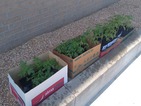News & Workshops
*********************************************************************************************************************************
Hungry for Tomatoes Project

Due to complications, BCCD did not complete the Project for 2023.
A big thank you to the Omaha School for growing tomato plants for our project in 2022. These were the first plants grown in the school's new green house! These plants were distributed to local nursing homes.
Due to complications, BCCD did not complete the Project for 2020 or 2021.
In 2019 BCCD partnered with the Lead Hill School Ag Dept to grow 30 containerized cherry tomato plants. These tomato plants were then taken to the Good Neighbors Cupboard, Diamond City; Harrison Nursing Home; Hillcrest Nursing Home; and the Hospice House of Harrison. These plants will provide much needed fresh nutrition.
In 2018, Plants Etc of Harrison partnered with BCCD to grow the tomato plants. The plants were then delivered to Mercy Mall for distribution to the needy.
*********************************************************************************************************************************
Celebrate Pollinators
"A Ghost in the Making: Searching for the Rusty Patched Bumble Bee," has recently been released. It is a short film about the disappearance of the rusty patched bumble bee and one man's journey to find out what's happened to it. After being received with acclaim at film festivals this spring, the film is now available at http://www.rustypatched.com/.
*********************************************************************************************************************************
Spring 2023 BCCD Newsletter
| summer_2023.pdf | |
| File Size: | 665 kb |
| File Type: | |
*********************************************************************************************************************************
Create Homes for Native Bees!
Many of the bees you may encounter make their burrow homes in the soil. Some bees create hives in snags (a dead or dying standing tree, often with its branches broken off) or in holes in trees. You can also encourage bee-residents by providing man-made nesting blocks or "Bee Condos."
Download the plan below to make your own bee condo today!
Many of the bees you may encounter make their burrow homes in the soil. Some bees create hives in snags (a dead or dying standing tree, often with its branches broken off) or in holes in trees. You can also encourage bee-residents by providing man-made nesting blocks or "Bee Condos."
Download the plan below to make your own bee condo today!
| build_a_bee_condo.pdf | |
| File Size: | 164 kb |
| File Type: | |
*********************************************************************************************************************************
Arkansas State Plant Board Confirms Emerald Ash Borer in Garland, Montgomery and Pike Counties
LITTLE ROCK, ARK. – Garland, Montgomery, and Pike Counties have been added to confirmed sites of the emerald ash borer (EAB) - an invasive beetle that feeds on and kills ash trees. Since the first Arkansas detection in 2014, EAB is confirmed in the following 17 counties: Bradley, Calhoun, Clark, Cleveland, Columbia, Dallas, Garland, Hempstead, Hot Spring, Lafayette, Montgomery, Nevada, Ouachita, Pike, Randolph, Saline, and Union. The Arkansas State Plant Board (ASPB) works with United States Department of Agriculture Animal and Plant Health Inspection Service (USDA APHIS) to confirm EAB sites.
Visit these websites for more information:
http://www.aad.arkansas.gov/quarantines
http://www.uaex.edu/publications/pdf/fsa-7066.pdf
For more quarantine details, contact the ASPB at (501) 225-1598 or email [email protected]
LITTLE ROCK, ARK. – Garland, Montgomery, and Pike Counties have been added to confirmed sites of the emerald ash borer (EAB) - an invasive beetle that feeds on and kills ash trees. Since the first Arkansas detection in 2014, EAB is confirmed in the following 17 counties: Bradley, Calhoun, Clark, Cleveland, Columbia, Dallas, Garland, Hempstead, Hot Spring, Lafayette, Montgomery, Nevada, Ouachita, Pike, Randolph, Saline, and Union. The Arkansas State Plant Board (ASPB) works with United States Department of Agriculture Animal and Plant Health Inspection Service (USDA APHIS) to confirm EAB sites.
Visit these websites for more information:
http://www.aad.arkansas.gov/quarantines
http://www.uaex.edu/publications/pdf/fsa-7066.pdf
For more quarantine details, contact the ASPB at (501) 225-1598 or email [email protected]
